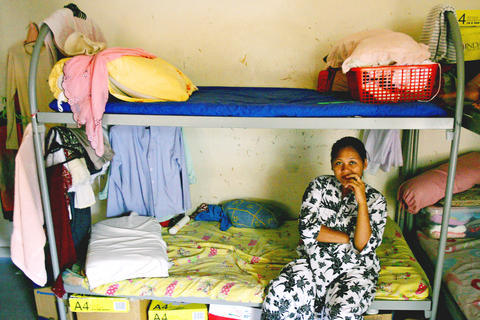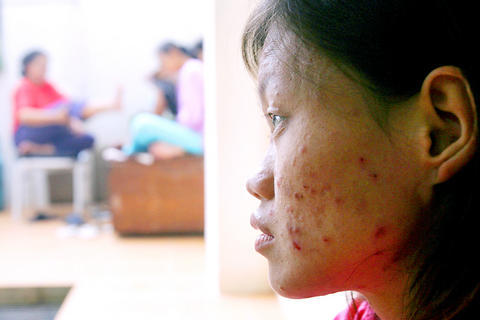Countless millions of Asian women leave their homes to work in foreign countries, and in a quiet dormitory behind the Indonesian embassy are some of the casualties of this mass migration.
Some of them have been beaten, raped or tortured with scalding water and hot irons, and nearly all have been treated like slaves and not paid for months or years of exhausting work.
Now they wait for their cases to be resolved via mediation with resentful former employers, or make their way painfully slowly through Malaysia's court system, before they can return to their villages and towns.

PHOTO: AFP
Malaysia is a relatively prosperous nation whose citizens have come to rely on foreign workers to care for their children, clean their homes and work on plantations.
But every year about 1,000 women come to the barracks-style accommodation built behind the embassy on a main thoroughfare in Kuala Lumpur, along with about 20 newborn babies -- often the product of sexual assault.
"I would tell other girls not to come here -- just look at what happened to me," says Suryani Enas, eight months pregnant after allegedly being raped by a member of a feared volunteer security corps accused of persecuting migrants in Malaysia.

PHOTO: AFP
In a common tale, Suryani explains she ran away from employers who refused to pay her for three years of work, only to find herself in the clutches of the officer who held her captive -- handcuffed and gagged -- for a month.
The case is now before the courts, but it could take years to get a verdict and the 20-year-old is anxious to return to her home in the Indonesian island of Lombok and raise her child the best she can.
"I was forced to be pregnant, and now I'm forced to love the child," she says simply as she holds her swollen belly, smiling bravely despite her ordeal.
The rights group Tenaganita ("Womanpower") says Malaysia is home to some 300,000 foreign domestic workers among a migrant workforce -- both legal and undocumented -- of more than three million.
It argues that foreign domestic workers here are made highly vulnerable by a lack of legal protection which subjects them to any working conditions an employer sees fit.
"We can safely say we are one of the worst states, the country that least protects foreign workers including domestic workers," Tenaganita migrant worker advocate Florida Sandasamy says.
"Domestic workers do not have days off, they can work 24 hours a day -- there are no rules," she says. "There is absolutely no protection for them, because the employment act only goes as far as paying workers their wages."
In contrast, women who come from the Philippines, whose government insists on contracts enshrining regular days off and payment, are rarely victims of abuse and earn up to four times the US$120 monthly wage of many Indonesians.
"Sad to say, Indonesia and the other countries do not share the same policies," Sandasamy says.
Up to 100 women live at any one time at the Indonesian embassy's shelter, a simple but scrupulously clean structure built in 2004 that is one of several around Asia and the Middle East.
Some stay for a few days, some for years.
The women keep themselves busy with washing, cleaning and cooking, but mostly spend their time sitting around quietly, often exchanging their stories of mistreatment at the hands of their Malaysian employers.
Many still bear the scars, scalds and wounds inflicted on them as recently as days before. Most are destined to remain anonymous, but the case of one of them, Nirmala Bonat, has achieved national notoriety.
Photographs of her dreadful injuries, allegedly inflicted by the Malaysian woman she worked for at an upmarket Kuala Lumpur condo, were splashed on the front pages of newspapers when she was discovered in 2004.
The 23-year-old says that after accidentally breaking a mug, she was abused every day until her breasts and back were covered with burns from a hot iron, and her face was swollen by regular beatings.
The alleged culprit has been brought to trial, but three years have gone by and it is nowhere near a conclusion.
"I'm hoping that the whole case is resolved as quickly as possible so I can return to Indonesia," Nirmala says in a voice barely above a whisper.
"I really regret coming here. This was my fate. Some people are lucky and get good jobs, but I was very unlucky," she says before breaking down in tears.
Sandasamy says that the protracted legal process is extremely damaging for women like Nirmala, who inevitably sink into depression as they are forced to put their lives on hold and endlessly relive the trauma.
"Very few cases go to court and the ones that do take a very long time. So where is the state's responsibility? If the employer is not taken to task, they become arrogant and feel they can do anything they want," she says.
Indonesian diplomat Tatang Razak, who heads the embassy's anti-abuse task force, says he can barely believe the treatment meted out to women who end up at the shelter, who also include many victims of sex trafficking.
Newspaper reports detail accounts of women allowed just one bowl of rice a day, allowed only a few hours sleep on the kitchen floor and made to wash dog kennels despite their Muslim beliefs.
Tatang says the situation has improved in recent years as Indonesia has demanded better treatment for its workers, but there are still tensions with the government uneasy about having so many here.
"Previously they welcomed Indonesians to Malaysia -- until 1970 it was very easy to become a Malaysian citizen," Tatang says. "Now that has all changed. They consider there are too many Indonesians. Their economy is advanced and they think they don't need the workers."

GAINING STEAM: The scheme initially failed to gather much attention, with only 188 cards issued in its first year, but gained popularity amid the COVID-19 pandemic Applications for the Employment Gold Card have increased in the past few years, with the card having been issued to a total of 13,191 people from 101 countries since its introduction in 2018, the National Development Council (NDC) said yesterday. Those who have received the card have included celebrities, such as former NBA star Dwight Howard and Australian-South Korean cheerleader Dahye Lee, the NDC said. The four-in-one Employment Gold Card combines a work permit, resident visa, Alien Resident Certificate (ARC) and re-entry permit. It was first introduced in February 2018 through the Act Governing Recruitment and Employment of Foreign Professionals (外國專業人才延攬及雇用法),

RESILIENCE: Deepening bilateral cooperation would extend the peace sustained over the 45 years since the Taiwan Relations Act, Greene said Taiwan-US relations are built on deep economic ties and shared values, American Institute in Taiwan (AIT) Director Raymond Greene said yesterday, adding that strengthening supply chain security in critical industries, enhancing societal resilience through cooperation and deepening partnerships are key to ensuring peace and stability for Taiwan in the years ahead. Greene made the remarks at the National Security Youth Forum, organized by National Taiwan University’s National Security and Strategy Studies Institution in Taipei. In his address in Mandarin Chinese, Greene said the Taiwan-US relationship is built on deep economic ties and shared interests, and grows stronger through the enduring friendship between

The Ministry of Transportation and Communications yesterday said that it would redesign the written portion of the driver’s license exam to make it more rigorous. “We hope that the exam can assess drivers’ understanding of traffic rules, particularly those who take the driver’s license test for the first time. In the past, drivers only needed to cram a book of test questions to pass the written exam,” Minister of Transportation and Communications Chen Shih-kai (陳世凱) told a news conference at the Taoyuan Motor Vehicle Office. “In the future, they would not be able to pass the test unless they study traffic regulations

‘COMING MENACINGLY’: The CDC advised wearing a mask when visiting hospitals or long-term care centers, on public transportation and in crowded indoor venues Hospital visits for COVID-19 last week increased by 113 percent to 41,402, the Centers for Disease Control (CDC) said yesterday, as it encouraged people to wear a mask in three public settings to prevent infection. CDC Epidemic Intelligence Center Deputy Director Lee Chia-lin (李佳琳) said weekly hospital visits for COVID-19 have been increasing for seven consecutive weeks, and 102 severe COVID-19 cases and 19 deaths were confirmed last week, both the highest weekly numbers this year. CDC physician Lee Tsung-han (李宗翰) said the youngest person hospitalized due to the disease this year was reported last week, a one-month-old baby, who does not